April 2020
Host Towns’ Ties with the World
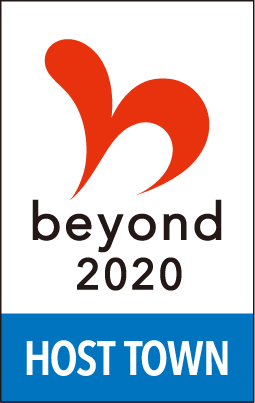
Host Towns across Japan are deepening their ties with the people of counterpart countries and regions that will take part in the Olympic and Paralympic Games in Tokyo.
The Host Town Initiative is a way for local governments in Japan to use sports, culture and economic activities to interact with citizens of counterpart countries and regions who will participate in the Olympic and Paralympic Games in Tokyo, and also to revitalize their local areas. This Host Town Initiative is the first in the history of the Olympic and Paralympic Games.
As of the end of February 2020, 487 local governments were registered as Host Towns. Also, around 167 countries and regions have registered as counterpart countries and regions. In the run up to the Games, various activities are already taking place between the Host Towns and these counterpart countries and regions, such as exchange between children and Olympians and Paralympians.
As well as the regular Host Towns, there are also: “‘Arigato’ Host Towns for Supporting Reconstruction” that link areas that suffered damage in the 2011 Great East Japan Earthquake and countries and regions that supported disaster-hit areas; “Host Towns of a Harmonious and Inclusive Society” that mainly use interaction with Paralympians to promote universal design town planning and a barrier free mindset; and “‘Tadaima • Okaeri’ Host Towns for welcoming the athletes after the Games” that will interact with athletes after the Games have finished.
Murayama City
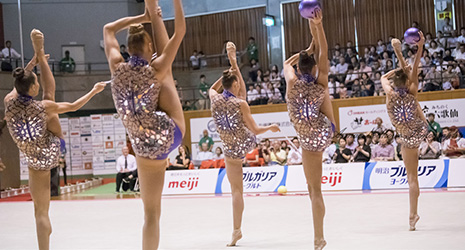
Murayama City in Yamagata Prefecture is a Host Town for Bulgaria and in 2017 held Japan’s first pre-Games training camp for the Bulgarian rhythmic gymnastics national team. The same team has been welcomed to Murayama each year since. In between training sessions, athletes and staff enjoyed experiencing Japanese culture such as the tea ceremony and going cherry picking, cherries being a local specialty. They also visited elementary schools in the area and held a joint training session with a local junior high school rhythmic gymnastics club. Around 2,000 local residents and others come to watch every time the team holds a public gymnastics competition. There is a wide variety of other projects underway too, such as camp support by local volunteers and anti-doping training for athletes and staff.
Mishima Village
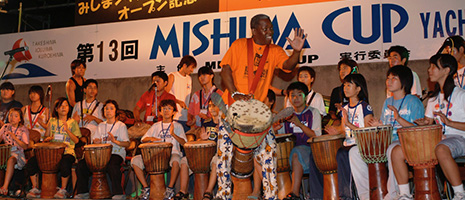
The village of Mishima is on a small island in Kagoshima Prefecture and is connected with Guinea as a “‘Tadaima • Okaeri’ Host Town for welcoming the athletes after the Games.” Cultural exchange between Mishima and Guinea started in 1994 when the world-famous Guinean djembe player Mamady Keïta visited the village and taught local children how to play the instrument (a type of drum from West Africa). Various exchange activities have continued since then, including inviting Mamady to hold workshops in Mishima and visits by local children to Guinea. In August 2019, to coincide with the Seventh Tokyo International Conference on African Development (TICAD), children from Mamady’s hometown visited Japan, held joint performances, and were invited to visit Mishima.
Iitate Village
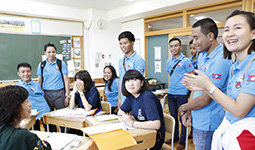
The village of Iitate, Fukushima Prefecture, which was struck by the 2011 Great East Japan Earthquake, is an ‘Arigato’ Host Town for Supporting Reconstruction, partnered with Laos. Prior to the disasters, exchange between Iitate and Laos started when Iitate had supported the construction of a junior high school in the Laos village of Dong Nyai. In September 2019, the Laos Paralympic swimming team staged a training camp in Iitate, using the indoor swimming pool of a local junior high school for their practice. During breaks between training sessions, the team observed classes and interacted with students over lunch breaks.
Ube City
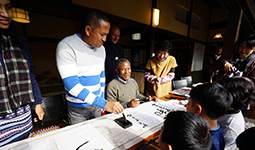
The city of Ube in Yamaguchi Prefecture has been designated a “Leading Host Town of a Harmonious and Inclusive Society,” a place which aims to create a coexistent society where anyone can live life to the fullest. The city started its own project in which ten junior high and high school students were designated “Ube City Harmonious and Inclusive Society Town Junior Supporters.” These children gather information on local events related to the realization of a coexistent society, then communicate that information. In December 2019, the city also invited track and field athletes from its Host Town counterpart of Spain, and also swimming and wheelchair basketball para-athletes from Madagascar, organizing exchange activities with citizens and elementary, junior high, and high school students through sports and traditional Japanese culture.
In these ways, Host Towns have interacted with athletes of counterpart countries and regions not only in sports, but also in areas such as music and food. The hope is that the relationships which have been established through these initiatives will continue for a long time even after the Olympic and Paralympic Games in Tokyo.

